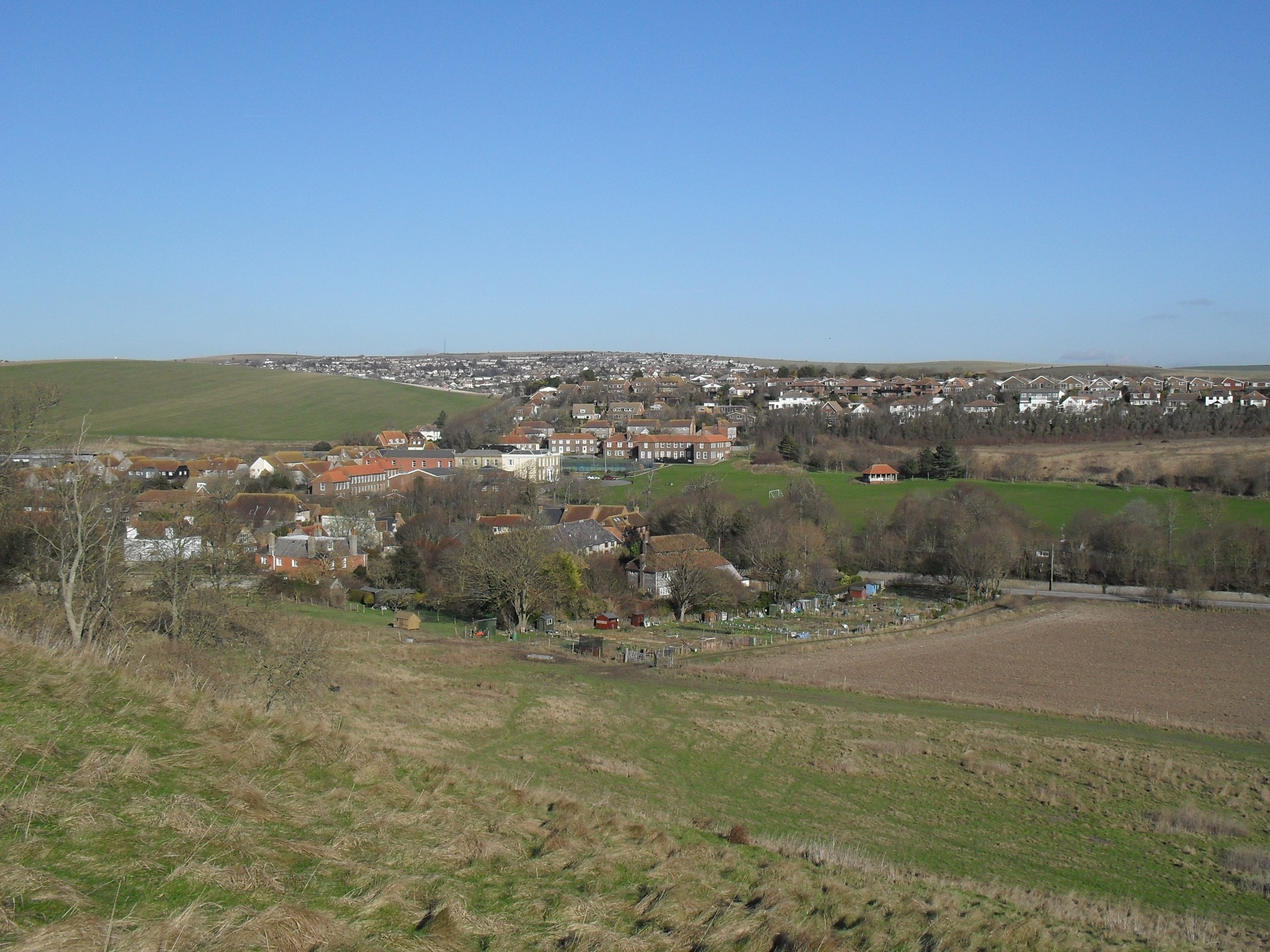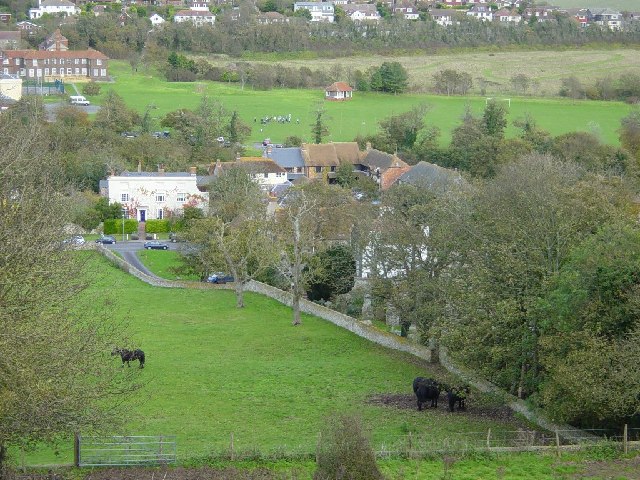Ovingdean on:
[Wikipedia]
[Google]
[Amazon]

 Ovingdean is a small, formerly agricultural, village in the east of
Ovingdean is a small, formerly agricultural, village in the east of

 Ovingdean is a small, formerly agricultural, village in the east of
Ovingdean is a small, formerly agricultural, village in the east of Brighton and Hove
Brighton and Hove () is a city and unitary authority in East Sussex, England. It consists primarily of the settlements of Brighton and Hove, alongside neighbouring villages.
Often referred to synonymously as Brighton, the City of Brighton and H ...
, East Sussex
East Sussex is a ceremonial and non-metropolitan county in South East England on the English Channel coast. It is bordered by Kent to the north and east, West Sussex to the west, and Surrey to the north-west. The largest settlement in East ...
, England.
Overview
It was absorbed into the administrative borough ofBrighton
Brighton () is a seaside resort and one of the two main areas of the City of Brighton and Hove in the county of East Sussex, England. It is located south of London.
Archaeological evidence of settlement in the area dates back to the Bronze A ...
, East Sussex
East Sussex is a ceremonial and non-metropolitan county in South East England on the English Channel coast. It is bordered by Kent to the north and east, West Sussex to the west, and Surrey to the north-west. The largest settlement in East ...
, England in 1928, and now forms part of the city of Brighton and Hove
Brighton and Hove () is a city and unitary authority in East Sussex, England. It consists primarily of the settlements of Brighton and Hove, alongside neighbouring villages.
Often referred to synonymously as Brighton, the City of Brighton and H ...
. It has expanded through the growth of residential streets on its eastern and southern sides, and now has a population of about 1,200. Some of the current housing replaces earlier shacks of the type once found in neighbouring Woodingdean and Peacehaven
Peacehaven is a town and civil parish in the Lewes district of East Sussex, England. It is located above the chalk cliffs of the South Downs approximately six miles () east of Brighton city centre, on the A259 road. Its site coincides with th ...
, built after the First World War
World War I (28 July 1914 11 November 1918), often abbreviated as WWI, was List of wars and anthropogenic disasters by death toll, one of the deadliest global conflicts in history. Belligerents included much of Europe, the Russian Empire, ...
. It almost abuts Rottingdean to the south-east and Woodingdean to the north-east, but still has open downland on its other sides, on which may be found a golf course and Brighton racecourse as well as some residual farmland.
The name, which is Old English for 'the valley of people associated with a man called Ōfa', shows that the village has existed since Anglo-Saxon times. Little seems to have disturbed its peace since. It is sometimes said to have been attacked by French raiders in the known incursion of 1377, but there is no hard evidence for this. The historic village is a conservation area. Its focus is the 11th century St Wulfram's Church. This dedication was only ever found in two other places in England (Grantham
Grantham () is a market and industrial town in the South Kesteven district of Lincolnshire, England, situated on the banks of the River Witham and bounded to the west by the A1 road. It lies some 23 miles (37 km) south of the Lincoln a ...
and Dorrington, both in Lincolnshire
Lincolnshire (abbreviated Lincs.) is a Counties of England, county in the East Midlands of England, with a long coastline on the North Sea to the east. It borders Norfolk to the south-east, Cambridgeshire to the south, Rutland to the south-we ...
- it has vanished at Dorrington).
Many homes in the conservation area are converted farm buildings, and the most prominent houses are Ovingdean Grange and Ovingdean Hall. The Grange is the subject of legend. In 1857, the popular novelist W. Harrison Ainsworth wrote ''Ovingdean Grange, A Tale Of The South Downs'', in which he described how the future King Charles II stayed there for less than 24 hours before escaping to France in 1651, fathering a child in the process. In reality, the King stayed at the George Inn in West Street, Brighton. The Hall is a gentry mansion which was the birthplace of Charles Eamer Kempe
Charles Eamer Kempe (29 June 1837 – 29 April 1907) was a British Victorian era designer and manufacturer of stained glass. His studios produced over 4,000 windows and also designs for altars and altar frontals, furniture and furnishings, lichg ...
, the stained glass window designer. It now serves as a language school for overseas residential students, Ovingdean Hall School. The majority of pupils are partially deaf or are equipped with cochlear implant
A cochlear implant (CI) is a surgically implanted neuroprosthesis that provides a person who has moderate-to-profound sensorineural hearing loss with sound perception. With the help of therapy, cochlear implants may allow for improved speech unde ...
s. Longhill High School
Longhill High School is a co-educational secondary school for 11 to 16 year-olds, which is located in Rottingdean, Brighton and Hove, East Sussex.
History
The school was officially opened in 1964, although took its first intake in 1963. The s ...
, a comprehensive school
A comprehensive school typically describes a secondary school for pupils aged approximately 11–18, that does not select its intake on the basis of academic achievement or aptitude, in contrast to a selective school system where admission is re ...
, is on the edge of the village, with its postal address in Rottingdean.
Among those buried in the churchyard are the inventor Magnus Volk
Magnus Volk FII (1851–1937) was a British inventor and pioneering electrical engineer.
He is most notable for having built Volk's Electric Railway, the world's oldest operating electric railway.
Career
Aside from the Volk's Electric Railwa ...
, the stained-glass artist Charles Kempe
Charles Eamer Kempe (29 June 1837 – 29 April 1907) was a British Victorian era designer and manufacturer of stained glass. His studios produced over 4,000 windows and also designs for altars and altar frontals, furniture and furnishings, lich ...
and the distinguished lawyer Helena Normanton
Helena Florence Normanton, QC (14 December 1882 – 14 October 1957) was the first woman to take advantage of the Sex Disqualification (Removal) Act 1919 and join an institution of the legal profession. In November 1922, she was the second woma ...
, one of the first female barristers and QCs. Also in the graveyard is a monument to the family of pioneer female medical student Sophia Jex-Blake
Sophia Louisa Jex-Blake (21 January 1840 – 7 January 1912) was an English physician, teacher and feminist. She led the campaign to secure women access to a University education when she and six other women, collectively known as the E ...
, who is buried some 25 miles (40 km) away in Rotherfield
Rotherfield is a village and civil parish in the Wealden District of East Sussex, England. It is one of the largest parishes in East Sussex. There are three villages in the parish: Rotherfield, Mark Cross and Eridge. The River Rother, which ...
.
The village has a single shop (a sub-post office
A post office is a public facility and a retailer that provides mail services, such as accepting letters and parcels, providing post office boxes, and selling postage stamps, packaging, and stationery. Post offices may offer additional se ...
) and no pubs
A pub (short for public house) is a kind of drinking establishment which is licensed to serve alcoholic drinks for consumption on the premises. The term ''public house'' first appeared in the United Kingdom in late 17th century, and was ...
.
Just outside the historic boundary of Ovingdean is Ian Fraser House, better known as St Dunstan's, a famous residential and rehabilitation centre for blind ex-servicemen. It was also the home of 113-year-old Henry Allingham, the last surviving founder-member of the RAF and briefly the world's oldest man.
Ovingdean is now the site of several proposed urban fringe sites due development under Brighton and Hove City Plan.
References
Further reading
* Carder, Tim, ''The encyclopaedia of Brighton''. Lewes: East Sussex County Council (1991). * Coates, Richard, ''A history of Rottingdean and Ovingdean through their place-names''. Nottingham: English Place-Name Society (2010). * Davies, John G., research papers deposited locally, in e.g. East Sussex Record Office; the present writer is indebted to these papers.External links
* http://www.mybrightonandhove.org.uk/page_id__6104_path__0p114p463p1255p.aspx {{authority control Villages in East Sussex Areas of Brighton and Hove Conservation areas in England